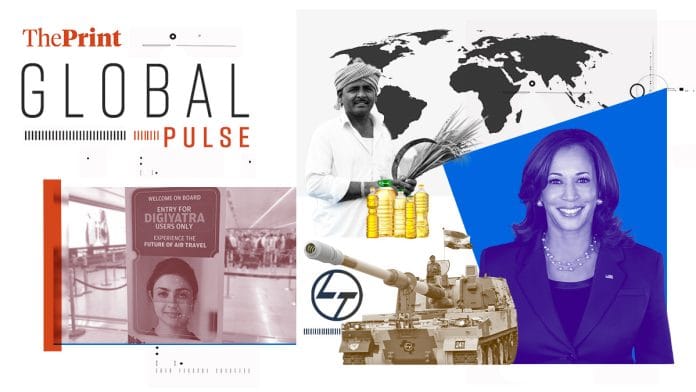New Delhi: A Washington Post article, ‘How India’s warm embrace of Kamala Harris grew chilly’ written by journalists Karishma Mehrotra and Anika Arora Seth, delves into how and why India’s initial excitement over Kamala D. Harris joining the Democratic presidential ticket in 2020 has cooled as she approaches a presidential nomination.
As the running mate to Joe Biden in 2020, Harris engaged with her heritage and roots publicly. This included a viral cooking video with Mindy Kaling and a 2019 memoir that explored her South Asian roots. After becoming vice-president, she has even hosted Diwali celebrations at the White House.
However, the sentiment in India has shifted. Harsh V. Pant of the Observer Research Foundation (ORF) told Washington Post, “It is fair to say that there is no real warmth for her in India.”
Indian analysts attribute this to her perceived distancing from her Indian roots and critical comments on Indian democracy and human rights, which they say has led to feelings of “rejection” among her Indian fans.
In an interview to the Financial Times, R. Shankar Raman, Larsen & Toubro (L&T) Chief Financial Officer, tells correspondent Chris Kay that India needs to increase business for domestic private companies in defence procurement, which is currently dominated by state-owned entities and imports.
In the article titled ‘India must use private defence suppliers more, says Larsen & Toubro’, Raman is quoted as saying that L&T’s production capacity far exceeds the opportunities provided by the Indian government.
“Defence infrastructure needs [an] overhaul and I think they need capable people to deliver that,” he said. “New Delhi currently relies heavily on inefficient state-owned firms such as Hindustan Aeronautics and Bharat Electronics. Meanwhile L&T, as per the report, is poised to play a bigger role as part of India’s ‘Make in India’ initiative. Analysts anticipate a significant rise in private sector participation, with revenues for private aerospace and defence companies expected to grow by 20% through March 2025.”
“There is a lot of opportunity brewing in the background and this pipeline is not just emanating from India,” Ankit Mehta, the chief executive of ideaForge, one of India’s biggest producers of drones that counts the country’s military as its top customer, tells FT.
A Bloomberg article, ‘India Boosts Planting of Oilseeds After Better Monsoon Rain’ highlights that India’s farmers have increased sowing of oilseeds and pulses due to higher-than-average monsoon rains.
According to a statement from the Ministry of Agriculture and Farmers Welfare, oilseed cultivation has risen by 3.8 percent to 17.17 million hectares, while pulse acreage has surged by 14 percent to 10.2 million hectares. This uptick comes as monsoon rains are 3 percent above normal, enhancing crop prospects, according to India Meteorological Department. Notably, India remains the world’s largest importer of edible oils. “Oilseed crops have been planted on about 17.17 million hectares (42.4 million acres), up 3.8 percent from a year earlier,” the ministry stated.
Another report by the Financial Times, ‘India expands airport facial recognition amid surveillance fears’, also written by Chris Kay, highlights that India is expanding its Digi Yatra facial recognition system to 28 airports, covering 90 percent of the country’s air travel. However, there are concerns about the emergence of a surveillance state in the world’s largest democracy, the report discusses.
Suresh Khadakbhavi, CEO of the Digi Yatra Foundation, highlights that the technology has “more than halved queueing times”.
Concerns, though, are rising about data privacy as India’s surveillance infrastructure grows. The Internet Freedom Foundation (IFF), a digital rights organisation, criticises the lack of transparency and potential government access to data.
Digi Yatra’s assurances are not “corroborated in policy…in fact, some of it contradicts it,” says Disha Verma, associate policy counsel at the IFF. “What is needed is evidence and what is needed is transparency by design, so that we don’t have to go run around like headless chickens trying to wonder where our data is going.”
Venezuelan protest and Khamenei’s official endorsement
Venezuelans have taken to the streets in protest following the official declaration by the electoral authority that President Nicolas Maduro won the recent presidential election. To know more about this, read the New York Times’s report.
Iran’s supreme leader Ayatollah Ali Khamenei has given his official endorsement to Dr Masoud Pezeshkian as the country’s ninth president, following snap elections won by the reformist camp’s candidate. To know more, read the latest report by the Dawn.
(Edited by )
Also read: Modi govt’s ‘strategic freeze on relations with Pakistan’ & why stand-up comedy in India is no joke






